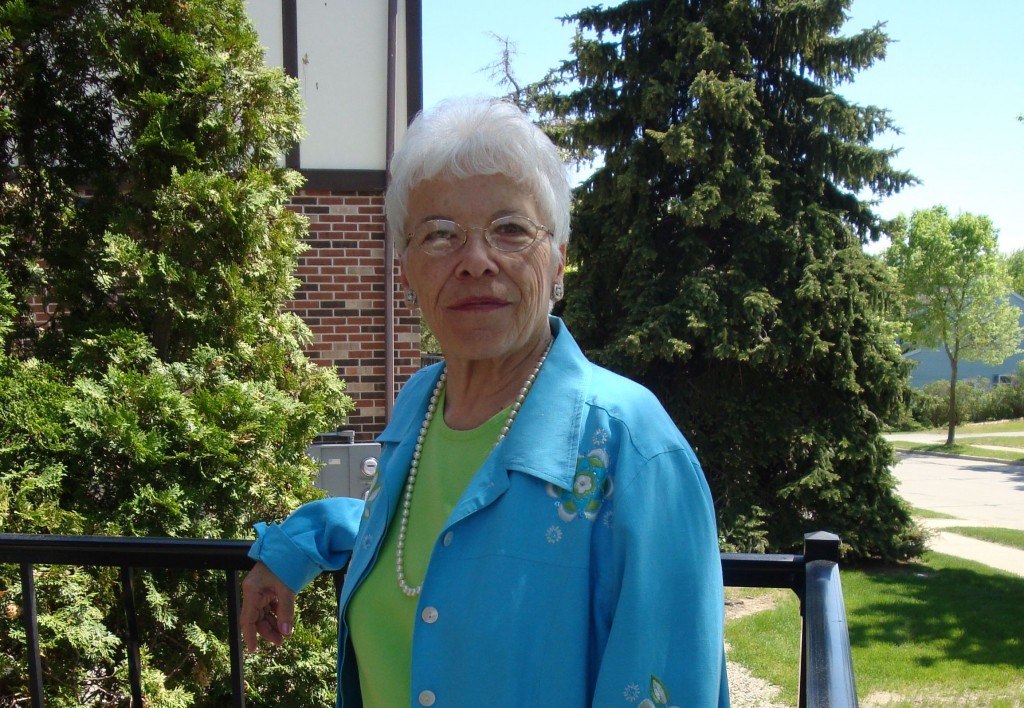by Kim Keller
“I just noticed in the Milwaukee paper that your mom passed away . . . Please know we all loved your mom. She was our neighborhood mom growing up. She would feed you, counsel you, but most of all would stand up for you as she did all the kids in her house. I’m sure she is organizing a cub scout troop in heaven as we speak.”
Alice Fox was 86 years old when she died on Easter Sunday. Her son, Joe, received the above message of condolence from a former neighborhood friend. Many of you probably remember Alice from the blogs I’ve written about some of the creative solutions her kids and grandkids, who refer to themselves affectionately as “Team Alice,” came up with to help Alice with her Alzheimer’s.
Alice was born in Milwaukee, Wisconsin, and she raised her kids — Mark, Paul, Mary Clare, Joe, Nancy, Laura, Chris, Jane and Marti — in a nearby suburb called Wauwatosa. I would imagine life was hectic with nine kids, but Alice still managed to find time to pursue her interests, such as reading, golfing, playing bridge and, perhaps her favorite pastime of all, cheering on her favorite teams, the Packers, the Brewers and the Marquette Golden Eagles (formerly the Marquette Warriors).
Most of Alice’s family stayed in the area, and so when her memory started giving way about seven years ago, Team Alice was right there by her side. Alzheimer’s is hard to detect, of course, since many people in their 70s are more than casually acquainted with failing memory, and Alice was no different. It started off with familiar little lapses, like forgetting a name or a conversation or misplacing the keys to the car.
Gradually, though, the signs became more alarming. Always capable and organized, Alice started struggling with everyday tasks: She’d become confused about whether or not she had taken her medications, she’d forget to pay her bills, she had difficulty keeping her checkbook and calendar straight, and for years she had followed the soap opera General Hospital, and suddenly couldn’t keep track of the characters or the story line.
Then there was this final incident: Alice was assembling packs of tickets for a church outing to see the Milwaukee Brewers baseball game with her seniors group called the “Go-Getters.” Thirty to forty people would be attending the outing, and Alice was responsible for placing their tickets in separate envelopes and writing their names on the front. This was an event Alice had organized for years, but this particular year, it was different, she was confused and having trouble.
So she called her eldest daughter, Mary Clare. “I’m messing up these tickets,” she complained. “I can’t remember if I put the right amount of tickets in the envelope before I sealed it.”
Mary Clare stopped by her mom’s house and found the tickets amid a pile of torn-open envelopes. She sat down with her mother and carefully re-packaged all the tickets. But the very next day, Alice called her daughter once again, worried about the tickets. Mary Clare reminded her mom they had completed the project only the day before. When she returned to her mom’s house, she found the envelopes opened up once again.
And with that, the Alzheimer’s testing began.
Always practical and a realist, Alice didn’t need a doctor to tell her the results of the test. “I didn’t pass,” she told Mary Clare.
Alice was presented quite a few challenges in her life. The most painful had been losing her 30-year-old son, Paul, to bone cancer in 1981. A crushing blow for any parent. Alice, of course, was heartbroken, but she was also determined to carry on. Alice was a fighter. And she would approach her Alzheimer’s diagnosis in the same fashion.
Alice would not be defeated.
Team Alice was there with her every step of the way. As Alice sunk deeper into the disease, the family became more and more inventive in finding solutions to the everyday challenges of Alzheimer’s: from a big-buttoned phone to make for easy dialing to an automated pill dispenser to effectively control Alice’s meds to an interlocking system of clothes hangers to arrange Alice’s daily outfits to a timer/nightlight system they set up to help Alice with her circadian rhythms, so she’d know when it was time to sleep and time to get up. Team Alice had a shared passion and a shared mission — Alice — and you can learn more about their clever solutions here.
Never one to waste time, Alice started planning for her own funeral about five years ago. She always hated going to an event and not knowing everyone’s name, so she started working with Mary Clare to make name tags for people to wear at her service. Yes, that’s right, Alice was worried about other people’s discomfort, even at her own funeral. She aimed to be organized to the very end. And she was so proud of her family, she wanted Team Alice to stand up together in front of the church, so that everyone who attended her funeral could see what a wonderful family she had.
She did have another request: “I want people to know that I was happy with my life.”
You will be missed, Alice. You and your family have been an inspiration to us at In Care of Dad. We are grateful that you came into our lives. Thank you for sharing your stories, and please know that you will always have a special place in our hearts.
Kim Keller is the Co-Founder of In Care of Dad. She lives and works in New York City.






